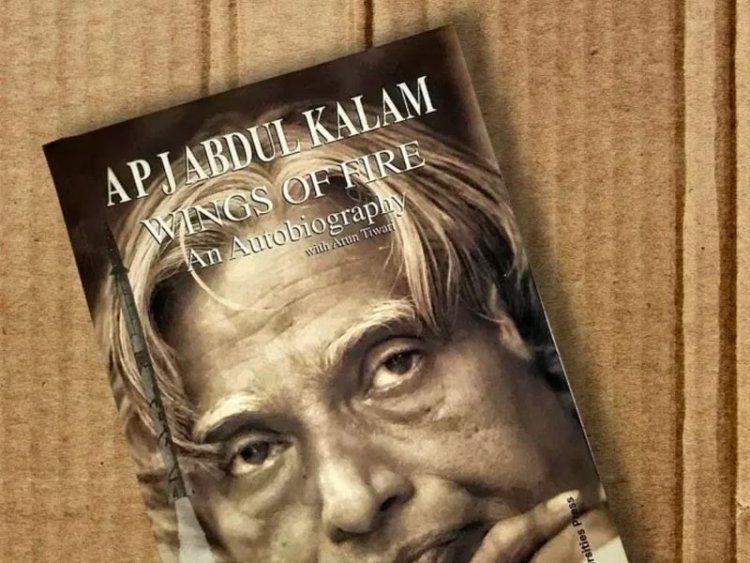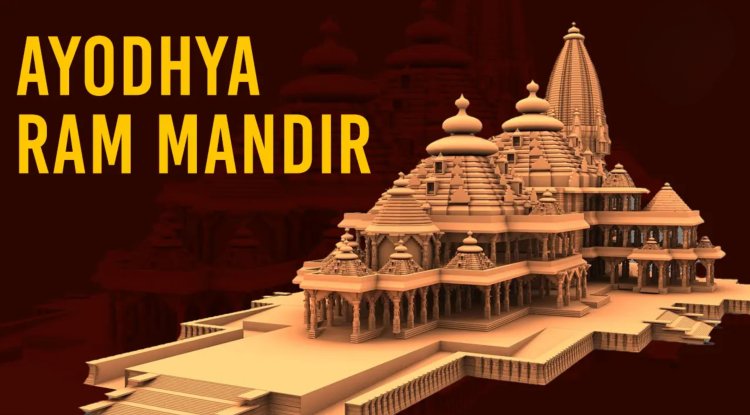Wings of Fire: A Review of Dr. A. P. J. Abdul Kalam's Inspiring Journey
Wings of Fire," the autobiography of Dr. A. P. J. Abdul Kalam, the "Missile Man of India" and former President of India, is more than just a chronicle of an individual's achievements. It's a tapestry woven with threads of perseverance, humility, vision, and unwavering faith in oneself and humanity. This review delves into the essence of the book, exploring its strengths, analyzing its impact, and reflecting on its lasting legacy.

From Humble Beginnings to Extraordinary Heights:
The book opens with a captivating portrayal of Kalam's childhood in Rameswaram, Tamil Nadu. We witness his simple life, shaped by the values of his family and the rhythms of the sea. His academic brilliance and unwavering determination shine through, even during times of financial hardship. The turning point arrives with his selection to study aerospace engineering at the Indian Institute of Technology Madras. This becomes the launchpad for a remarkable journey, marked by significant contributions to India's space and missile programs.
A Glimpse into Scientific Brilliance:
Kalam's meticulous recounting of his work at the Indian Space Research Organization (ISRO) ignites a sense of awe and admiration. His involvement in projects like the Rohini satellite launch and the development of the Agni missile program not only showcase his technical prowess but also highlight his leadership qualities. He narrates challenges overcome with characteristic optimism and emphasizes teamwork as the driving force behind success.
Beyond Science: A Leader Driven by Values:
"Wings of Fire" transcends the realm of scientific achievements. It delves into Kalam's philosophies and values, revealing a leader deeply invested in the progress of his nation and the well-being of its people. He emphasizes the importance of education, particularly for the youth, and encourages them to dream big and work tirelessly towards their goals. His inspirational quotes, scattered throughout the book, encapsulate his beliefs and inspire readers to find their own inner fire.
Lessons in Leadership and Life:
The book weaves in personal anecdotes and interactions with individuals who shaped Kalam's life. These tales offer valuable insights into his leadership style, characterized by empathy, inclusivity, and a constant quest for knowledge. He shares failures and setbacks with honesty, showcasing his resilience and unwavering belief in overcoming challenges. His interactions with world leaders offer glimpses into international diplomacy and his efforts to strengthen India's global standing.
Impact and Legacy:
"Wings of Fire" has transcended the boundaries of an autobiography, becoming a beacon of inspiration for millions. It has resonated with people across generations, cultures, and social backgrounds. Its message of hope, perseverance, and the power of dreams has touched hearts and ignited a fire in aspiring minds.
Strengths and Analysis:
The book's greatest strength lies in its simplicity and sincerity. Kalam's narrative style is lucid and engaging, making the book accessible to a wide audience. The anecdotes and personal reflections lend authenticity and warmth to the story. Moreover, the book avoids technical jargon, making it easily understood even by non-scientific readers.
However, certain sections might feel less detailed, leaving readers wanting deeper insights into specific scientific projects or political scenarios. Additionally, the book primarily focuses on Kalam's professional achievements, with less emphasis on his personal life and family dynamics.
Navigating a Changing Landscape: Exploring the Socio-political Context of Kalam's Life
Dr. A. P. J. Abdul Kalam's life intertwined with India's evolving socio-political landscape, shaping both his experiences and influencing his remarkable journey. Understanding this context adds depth and perspective to his autobiography, "Wings of Fire."
Early Years and Independence:
Born in 1931, Kalam witnessed the final years of British Raj and the euphoria of India's independence in 1947. However, partition's scars and communal tensions were fresh, posing challenges of national unity and integration. Despite this, the nascent nation embarked on ambitious development plans, fostering optimism and a belief in progress.
Challenges and Opportunities:
- Economic Struggles: India faced poverty, food insecurity, and a burgeoning population. While Kalam pursued higher education, witnessing these challenges ignited his desire to contribute to scientific advancements for socio-economic development.
- Geopolitical Realities: The Cold War cast its shadow, impacting India's foreign policy and alliances. Kalam's work in missile technology emerged from this context, contributing to India's strategic deterrence capabilities.
- Social Upheaval: Social inequalities and caste discrimination persisted, highlighting the need for inclusive development. Kalam's emphasis on education and empowerment resonated deeply in this context, aiming to bridge societal gaps.
- Demographic Shift: India's young population presented both a challenge and an opportunity. Kalam championed the youth, urging them to dream big and contribute to nation-building, evident in his interactions with students and communities.
Kalam's Response:
Navigating these complex realities, Kalam embraced opportunities to serve the nation. He played a pivotal role in India's space program, symbolizing progress and innovation. His contributions to missile technology, while sometimes controversial, were seen by many as essential for national security. His leadership transcended scientific achievements, emphasizing education, inclusivity, and a vision for a developed and peaceful India.
Kalam's Impact on Specific Communities: A Ripple Effect of Inspiration
Dr. A. P. J. Abdul Kalam's work and vision transcended his scientific achievements, leaving a lasting impact on various communities in India. Here's how his influence resonated with specific groups:
1. The Youth:
- Igniting Dreams: Kalam's interactions with students were legendary. He tirelessly motivated them to dream big, pursue science and technology, and contribute to nation-building. His "Ignited Minds" program nurtured young talent, encouraging innovation and entrepreneurship.
- Education Champion: He advocated for quality education for all, especially in rural areas. His "Mission 2020" aimed to improve the scientific literacy of 10 million students, emphasizing the role of education in empowering future generations.
- Unleashing Potential: Kalam's belief in the youth's potential was infectious. He interacted with diverse groups, from school children to college students, inspiring them to become responsible citizens and leaders.
2. Women:
- Breaking Barriers: Kalam actively spoke about gender equality and encouraged women to pursue careers in science and technology, previously considered male-dominated domains.
- Leadership Advocate: He supported initiatives like the Women Scientists Development Programme, promoting women's leadership in scientific research and decision-making.
- Role Model: Kalam's own journey, overcoming social and financial limitations, resonated with women facing similar challenges, serving as a powerful example of achieving dreams despite obstacles.
3. Marginalized Groups:
- Inclusive Vision: Kalam emphasized the need for an inclusive society that empowered all citizens, regardless of their caste, religion, or socioeconomic background.
- Education for All: He believed education was the key to bridging social divides. His initiatives like "PURA (Providing Urban Amenities in Rural Areas)" aimed to bridge development gaps and uplift marginalized communities.
- Champion of the Underprivileged: Kalam actively engaged with and advocated for the rights of disadvantaged communities, highlighting their struggles and seeking solutions for their upliftment.
4. Beyond Borders:
- Bridging Divides: Kalam's vision of a peaceful and prosperous world extended beyond India. He engaged in interfaith dialogues and promoted cultural understanding, inspiring young people globally to work towards a better future.
- Universal Inspiration: His message of peace, tolerance, and striving for excellence resonated with diverse communities worldwide, encouraging individuals to contribute to positive change.
Dr. Kalam's impact on specific communities, from the youth to marginalized groups, was profound and multifaceted. He served as a role model, an advocate, and a source of inspiration, his work and vision leaving a lasting legacy that continues to empower individuals and communities to contribute to a better future.
Kalam's Global Reach: Beyond National Boundaries
Dr. A. P. J. Abdul Kalam's contributions transcended India's borders, fostering international collaborations and impacting global scientific advancements. Here's a deeper look at these endeavors:
International Collaborations:
- Space Exploration: Kalam played a key role in establishing the Indo-French satellite launch agreement, paving the way for joint missions like Megha-Tropiques and SARAL. He also collaborated with Russia on the BrahMos supersonic cruise missile project, showcasing India's prowess in missile technology.
- Technology Partnerships: He actively fostered collaborative research with institutions like the Massachusetts Institute of Technology (MIT) and the National Aeronautics and Space Administration (NASA). These partnerships facilitated knowledge exchange and joint technology development projects.
- Global Forums: Kalam actively participated in international scientific conferences, like the International Astronautical Congress (IAC). He shared his expertise and engaged in discussions on critical global issues like space exploration and sustainable development.
Contributions to Global Scientific Advancements:
- Missile Technology: Kalam's work on missile development, while primarily aimed at India's security needs, contributed to the global discourse on missile proliferation and non-proliferation. His expertise and advocacy for peaceful uses of space exploration also influenced international treaties and initiatives.
- Space Research: His involvement in India's satellite launch programs facilitated collaborations and knowledge sharing in areas like remote sensing, telecommunications, and weather forecasting. This contributed to advancements in global space research and its applications.
- Sustainable Development: Kalam's vision for a developed India emphasized inclusive and sustainable growth. He actively engaged in international discussions on poverty alleviation, renewable energy, and environmental protection, influencing global approaches to these critical challenges.
Beyond Collaborations:
- Inspiring Leadership: Kalam's charisma and message of peace, compassion, and scientific progress resonated with audiences worldwide. He was invited to speak at universities, conferences, and public events, inspiring young minds and leaders across the globe.
- Bridging Cultures: Kalam emphasized the importance of cultural understanding and collaboration for creating a peaceful world. He engaged in interfaith dialogues and promoted educational exchanges, fostering global connections and mutual respect.
Dr. Kalam's international collaborations and contributions to global scientific advancements extended far beyond his scientific achievements. He served as a bridge between nations, fostering collaborations, inspiring generations, and contributing to a more peaceful and prosperous world. His legacy continues to inspire scientists, leaders, and individuals worldwide to strive for positive change and global collaboration.
Kalam's Work: Criticisms and Controversies
While Dr. A. P. J. Abdul Kalam is widely celebrated for his achievements and inspirational persona, it's important to acknowledge certain criticisms and controversies surrounding his work and legacy for a balanced perspective. Here are some key points:
Criticisms of his scientific work:
- Military focus: Some criticized his focus on missile technology, arguing it diverted resources from other developmental needs and contributed to an arms race in the region.
- Lack of transparency: Concerns were raised about the lack of public scrutiny in certain defense projects, particularly related to cost and technology transfers.
Criticisms of his political views:
- Limited social reforms: Some argue his vision for development focused more on technological advancements than addressing social inequalities and caste discrimination.
- Support for nuclear program: His vocal support for India's nuclear program faced criticism from proponents of disarmament and non-proliferation.
Criticisms of his leadership:
- Decision-making in Pokhran II: His role in the 1998 Pokhran-II nuclear tests, while seen by some as a demonstration of national strength, was criticized by others for escalating regional tensions.
- Economic policies during his presidency: Some economists critiqued the economic policies followed during his term as President, arguing they favored large corporations over inclusive development.
Kalam's response:
- Kalam generally engaged with critiques through speeches, articles, and his autobiography, often highlighting the national security rationale behind his decisions and emphasizing the peaceful applications of scientific advancements.
- He maintained that scientific progress and economic development were crucial for India's social upliftment and reiterated his commitment to inclusivity and peace.
Learning from these perspectives:
- Recognizing these criticisms allows for a more nuanced understanding of Kalam's complex legacy, appreciating his achievements while acknowledging potential shortcomings.
- It opens up space for critical discussions about development priorities, the role of science in society, and the ethical considerations of scientific and technological advancements.
- This approach emphasizes the importance of transparency, accountability, and inclusivity in leadership and decision-making processes.
The Enduring Legacy: Analyzing Kalam's Impact in Contemporary India and Beyond
Dr. A. P. J. Abdul Kalam's work and philosophy continue to resonate in contemporary India and beyond, leaving a lasting impact on various aspects of society. Here's an analysis of this ongoing influence:
In India:
- Inspiring Youth: Kalam's message of dreaming big, pursuing excellence, and contributing to nation-building remains a powerful motivator for young Indians. His initiatives like "Ignited Minds" continue to inspire STEM education and entrepreneurship.
- Scientific Advancement: Kalam's vision for a technologically advanced India has propelled ongoing space research, missile development, and advancements in renewable energy. His legacy encourages continued investment in science and technology as drivers of national progress.
- Social Development: While critiques of limited social reforms remain, Kalam's emphasis on education for all and inclusive development continues to influence policies and initiatives aimed at bridging social divides and empowering marginalized communities.
- Interfaith Dialogues: His call for peaceful coexistence and understanding between cultures remains relevant in a diverse and often divided India. His legacy inspires continued efforts to promote tolerance and interfaith dialogue.
Beyond India:
- Global Collaboration: Kalam's advocacy for international cooperation in science and technology continues to influence collaborations and knowledge sharing between nations. His vision for a peaceful and prosperous world resonates with individuals and leaders worldwide.
- Sustainable Development: His focus on inclusive and sustainable development remains a crucial global challenge. His vision inspires ongoing efforts towards poverty alleviation, environmental protection, and responsible use of technology for global well-being.
- Leadership Inspiration: Kalam's leadership style, emphasizing inclusivity, empathy, and vision, continues to inspire leaders across various sectors. His emphasis on ethical leadership resonates in discussions about good governance and social responsibility.
Challenges and Adaptations:
- The changing needs of society require adapting Kalam's vision to contemporary challenges. Issues like climate change, digital equity, and ethical considerations of new technologies present opportunities to reinterpret his ideas for the 21st century.
- Balancing national security concerns with peaceful applications of technology remains a complex issue, requiring nuanced approaches informed by Kalam's emphasis on both scientific progress and responsible leadership.
Dr. A. P. J. Abdul Kalam's legacy goes beyond individual achievements. His work and philosophy continue to shape scientific advancements, inspire youth, and encourage collaborative efforts towards a better world. By adapting his vision to new challenges and recognizing potential critiques, his impact can continue to inspire positive change in the years to come.
Literary Style and Structure of "Wings of Fire": Conveying Inspiration Through Simplicity
Dr. A. P. J. Abdul Kalam's "Wings of Fire" transcends a simple autobiography, becoming a tapestry of inspiration woven with personal anecdotes, reflections, and quotations. Analyzing its literary style and structure reveals how these elements effectively convey Kalam's message of perseverance, humility, and unwavering belief in oneself and humanity.
Style:
- Lucidity and Simplicity: Kalam utilizes a lucid and straightforward writing style, easily understood by readers of all backgrounds. Complex scientific concepts are explained in accessible language, avoiding jargon and technicalities. This simplicity makes the book engaging and ensures the core message reaches a wide audience.
- First-Person Narrative: The first-person narrative allows readers to directly connect with Kalam's thoughts and experiences. His emotions, struggles, and triumphs become tangible, fostering empathy and a deeper understanding of his journey.
- Anecdotes and Stories: The book is peppered with captivating anecdotes and personal stories, drawing readers into Kalam's life. These tales illustrate his principles, values, and decision-making, making his personality and experiences relatable.
- Humor and Humility: Despite facing challenges, Kalam infuses his narrative with humor and humility. This humanizes him, making him more than just a scientific icon, but a person readers can connect with on a personal level.
Structure:
- Chronological Journey: The book follows a chronological progression, starting with Kalam's childhood and tracing his life through significant milestones. This structure allows readers to witness his growth and evolution, understanding how his experiences shaped his beliefs and achievements.
- Thematic Chapters: While chronological, the book is divided into thematic chapters like "Orientation," "Creation," and "Contemplation." This thematic organization highlights the overarching message of overcoming obstacles, building success, and reflecting on one's journey.
- Quotes and Inspiration: Throughout the book, Kalam incorporates inspiring quotes from various sources, adding depth and perspective to his own narrative. These quotes resonate with readers, serving as nuggets of wisdom and encouragement.
Overall Impact:
The combination of simple yet impactful writing, personal anecdotes, and thematic structure effectively conveys Kalam's message. Readers connect with his journey, internalize his lessons, and feel inspired to pursue their own dreams.
- Accessibility: The simplicity of style ensures the book's message reaches a wide audience, especially young people who can easily identify with Kalam's early struggles and aspirations.
- Emotional Connection: Personal anecdotes and reflections create emotional connections, leaving a lasting impact on readers who resonate with Kalam's challenges and triumphs.
- Inspiration and Motivation: Quotations and Kalam's own words serve as constant sources of inspiration, motivating readers to overcome obstacles and strive for their goals.
"Wings of Fire" goes beyond merely recounting facts; it crafts a tapestry of inspiration. The combination of literary style, narrative structure, and personal elements creates a powerful and moving experience for readers, ensuring that Kalam's message of hope and perseverance continues to resonate across generations.
Comparing "Wings of Fire": Exploring Uniqueness and Genre Insights
Dr. A. P. J. Abdul Kalam's "Wings of Fire" stands out within the vast landscape of autobiographies. Comparing it to other notable works reveals its unique qualities and offers insights into the autobiography genre itself.
Comparisons and Contrasts:
- Nelson Mandela's "Long Walk to Freedom": Both chronicle journeys overcoming societal inequalities and injustices. While Mandela focuses on political struggles, Kalam delves into scientific and personal growth, highlighting resilience and individual potential.
- Malala Yousafzai's "I Am Malala": Both advocate for education and empowerment. Malala narrates her fight for girls' education, while Kalam focuses on broader societal progress, emphasizing science and technology as tools for advancement.
- Benjamin Franklin's "Autobiography": Both detail self-improvement and social impact. Franklin emphasizes practicality and civic engagement, whereas Kalam prioritizes scientific pursuit and igniting dreams, appealing particularly to younger audiences.
Unique Qualities of "Wings of Fire":
- Science-Centric Narrative: "Wings of Fire" uniquely merges a personal journey with the history of India's scientific advancements. This perspective offers valuable insights into the intersection of individual ambition and national progress.
- Inspiring Tone: The book adopts a primarily optimistic and motivational tone, emphasizing hope and personal responsibility. This sets it apart from autobiographies focusing on overcoming adversity, as it actively inspires readers to take action.
- Focus on the Youth: Kalam's direct interactions with young people permeate the narrative, making it particularly impactful for aspiring individuals seeking guidance and motivation.
Insights into the Autobiographical Genre:
- The Power of Personal Narrative: "Wings of Fire" demonstrates how personal stories can transcend individual experiences, serving as tools for inspiration and social commentary.
- Genre Flexibility: The book pushes the boundaries of the traditional autobiography, incorporating elements of scientific discourse and motivational guidance, showcasing the genre's potential for diverse styles and messages.
- Impact Beyond Individual Lives: By weaving personal experiences with socio-political contexts, "Wings of Fire" illustrates how autobiographies can offer valuable insights into broader historical and cultural narratives.
Dr. Kalam's "Wings of Fire" is a unique and impactful addition to the autobiography genre. It transcends personal recounting, inspiring readers through its message of hope, perseverance, and the power of dreams. By comparing it with other notable works and analyzing its stylistic choices, we gain valuable insights into the genre's flexibility and its potential to contribute beyond individual stories. This exploration encourages us to appreciate "Wings of Fire" not only as a personal journey but also as a powerful tool for social good and individual empowerment.
Conclusion:
"Wings of Fire" is not just a book; it's an experience. It's an invitation to dream, to strive, and to believe in the power of individual potential. Kalam's life story serves as a testament to the fact that success can be achieved regardless of one's background, as long as there is unwavering determination and a clear vision. Even though circumstances may change, the core message of the book remains timeless: with ambition, hard work, and a compassionate heart, anyone can achieve extraordinary things and contribute to the betterment of society.
Disclaimer:
While I have strived to provide a comprehensive and informative analysis of Dr. A. P. J. Abdul Kalam's "Wings of Fire" and his legacy, it is important to remember that my analysis is based on the information and resources available to me.
It is always recommended to conduct your own research and explore diverse perspectives to gain a nuanced understanding of complex topics like Dr. Kalam's life, work, and legacy.
Additional Links:
- Official website of Dr. A. P. Abdul Kalam: https://kalamcentre.com/
- "Wings of Fire" on Goodreads: https://www.goodreads.com/series/92037-wings-of-fire
- Articles on Dr. Kalam:
- Documentaries on Dr. Kalam:
- "Ignited Mind: The Legacy of APJ Abdul Kalam" (2013)
- "Missile Man of India: APJ Abdul Kalam" (2018)
What's Your Reaction?


















